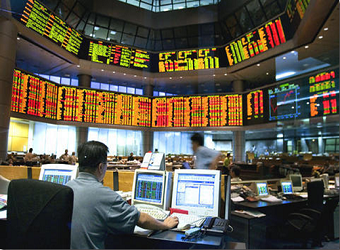Asian markets had a choppy session on Friday after oil prices surged more than two percent and the Nikkei fell to a four-month low earlier in the session after the U.S. fired dozens of cruise missiles at a Syrian airfield.
The missile strikes occured as President Donald Trump was hosting Chinese President Xi Jinping at his Mar-a-Lago resort in Florida.
A U.S. military official told NBC that 59 tomahawks had been fired from U.S. navy destroyers, which hit an airfield near Homs.
The missiles hit aircraft and infrastructure including the runway, NBC reported.
There has been no word on casualties yet, but no people were targeted, the official told NBC.
In a statement, Trump said he had called for the military strike in response to a chemical attack in a rebel-held area in northern Syria.
The missile attack was launched at 8:40 am HK/SIN on Friday, or 8:40 pm EDT on Thursday evening.
The dollar index traded at 100.650, after recording a three-week high at 100.77 earlier in the morning.
On the energy front, Brent crude futures rose more than two percent before easing to a gain around 1.42 percent at $55.67 a barrel while U.S. crude added 1.61 percent to $52.53.
“Oil prices have naturally reacted to the U.S. bombings of Syria. It is their wont to rally on news like this, but they have always fallen back,” said John Kilduff, founding partner of Again Capital.
“The fact is that oil infrastructure is rarely damaged, and the petrodollars are the spoils of war- neither side wants to kill the ‘petro-goose.’ If anything, this airstrike sets back ISIS and makes Middle East oil supplies more secure, not less,” Kilduff said.
U.S. futures fell after the news with Dow Jones futures down 44 points and S&P 500 futures off around 5 points, while Nasdaq futures eased by 12 points.
The U.S. ten-year yield hit a low of 2.289 percent, the lowest level since November 22 when the 10-year yielded as low as 2.287 percent.
Other safe-haven assets were also higher on Friday. Spot gold was trading 1.05 percent higher at $1,264.40 an ounce, its highest level in five months.
The yen traded higher against the dollar at 110.48. It had previously snapped six consecutive sessions of strengthening earlier in the session.
Asian shares initially fell after news of the missile strike broke but later stabilized.
The Nikkei share average registered a four-month low of 18,517.43 even though the index had made gains of 0.8 percent earlier in the session.
Japan’s benchmark index recovered to close 0.36 percent or 67.57 points higher, at 18,664.63.
“Once the initial shock to the system came through, investors panicked and moves happened, but new information is needed to maintain the pressure on the Nikkei,” said ThinkMarkets senior market analyst Matt Simpson, adding that markets were in a holding pattern.
The Kospi was 0.05 percent or 1.02 points lower to close at 2,151.73, while the ASX 200 declined by 0.11 percent or 6.215 points, to finish at 5,862.5.
Mainland Chinese markets were in the green, with the Shanghai Composite 0.22 percent higher and the Shenzhen Composite inching up by 0.043 percent. Hong Kong’s benchmark Hang Seng Index dropped by 0.62 percent.
President Xi arrived at West Palm Beach earlier in the day for the highly anticipated talks that are expected to focus on trade issues and North Korea. Speaking to the media before a dinner with the Chinese president, Trump said he thought he would have a “very, very great relationship” with Xi.
Meanwhile, in corporate news, Samsung shares closed 0.57 percent lower at 2,080,000 won ($1,833.54) per share after the company released its first quarter guidance. The company said operating profits are expected to rise by nearly 50 percent on year.
The Reserve Bank of India held its benchmark repo rate steady on Thursday at 6.25 percent but raised the reverse repo rates by 25 basis points to 6 percent.
The reverse repo rate refers to the interest rates banks get for deposits with the RBI.
“The hike in the reverse repo is very much related to the after effect of demonetization as there is excess liquidity in the system,” said Clive McDonnell, head of equity strategy at Standard Chartered Private Bank, in a CNBC interview.
Stateside, equities closed higher, albeit off the highs recorded in the session. The Dow Jones industrial average closed higher by 0.07 points at 2,0662.95 points and the S&P 500 was up 0.19 percent at 2,357.49. U.S. weekly jobless claims stood to 234,000 last week, the largest fall in nearly two years.
Source: CNBC


